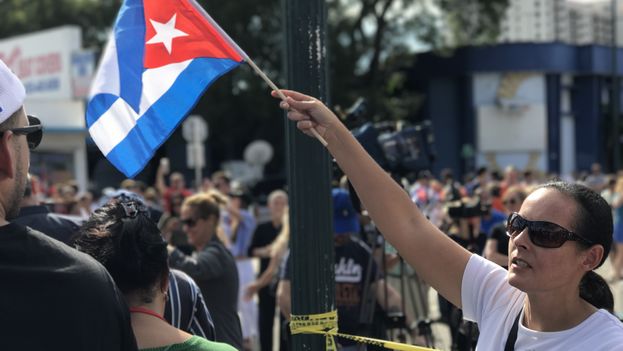![]() 14ymedio, 26 November 2016 – Thousands of Cubans poured into Miami’s streets in the early morning hours to celebrate the death of Fidel Castro, Cuba’s former ruler, who held onto power for almost five long decades. To the rhythm of “Our Day is Coming” by Willy Chirino and “In Case I Don’t Return,” by the late Celia Cruz, the exiles celebrated surviving the man who dominated with an iron fist the destinies of those on the Island of Cuba.
14ymedio, 26 November 2016 – Thousands of Cubans poured into Miami’s streets in the early morning hours to celebrate the death of Fidel Castro, Cuba’s former ruler, who held onto power for almost five long decades. To the rhythm of “Our Day is Coming” by Willy Chirino and “In Case I Don’t Return,” by the late Celia Cruz, the exiles celebrated surviving the man who dominated with an iron fist the destinies of those on the Island of Cuba.
“Here we are celebrating freedom for the Cuban people. Satan has died, a man who plunged the people into misery and hunger,” said Maria Cristina Labrada Varona, member of the Ladies in White on a visit to the city of Miami.
The leader of the Democracy Movement, Ramon Saul Sanchez, explained to 14ymedio that the exiles do not rejoice at the death of a human being but “at the disappearance of a symbol that is used as a sword of Damocles against civil society activists and all who want to democratize Cuba.”
Sanchez says that “Raul and his brother Fidel Castro were responsible for making the dynastic transfer” and argues that military exercises like the Bastion 2016 were carried out in order to intimidate people and so that people did not pour into the streets.
“The Cuban is changing in his heart, he wants liberty. One day we are going to see that this happiness that is seen in the Cuban exile is going to be apparent to everyone,” said Sanchez.
Ufracio Gonzalez, a boxing trainer attending the demonstration explained that he decided to go out to the streets with his young daughter to celebrate the death of the dictator because “That man has done a lot of damage to Cubans. We have memories of suffering and bitterness.”
Not only Cubans were among the celebrators. Venezuelans and Latin Americans decided to share the joy of the exiles. Lia Fausta, a Brazilian living in Miami, says that she does not celebrate the death of Fidel Castro but a new life for Cuba and for all the countries in the Americas.
“Lula, Dilma Rousseff, Evo Morales, Nicolas Maduro, Ortega and Santos. We must free ourselves from these people who destroy the future of our young people,” she explained.
“I love Cuba. My mother was a woman who loved the Island. All my life the only thing I heard was ‘what a shame that this has happened (the Cuban Revolution) to a country that was the most beautiful in the Caribbean,’” she added.

Since early morning the county police have been present and closed downtown’s Eighth Street in Little Havana, the quintessential meeting place for Cuban immigrants in south Florida, estimated at about two million people.
“It is a family celebration. You find the same thing among the old and the young. No one has wanted to stay home. It is something that we owe to our parents, our grandparents, to all who suffered the worst of the Castro tyranny,” comments Elquiades Suarez, 40 years of age.
In the afternoon Willy Chirino and other famed local artists visited the restaurant Versailles.
Cuban-American members of congress also met to give a joint statement.
“We are not going to expect big changes,” said the recently re-elected Ileana Ros-Lehtinen in a joint press conference with Republicans Mario Lincoln Diaz-Balart and Carlos Curbelo.
Ros-Lehtinen also threw a bucket of cold water on those who expect rapid changes on the Island with the death of Castro: “Do not expect Fidel’s death to open a door to a new chapter of liberty. It is not so easy.”
“What we need is freedom for the Cuban people, freedom of expression and everything that is written in the Helms-Burton law.”
Diaz-Balart for his part said that Fidel Castro’s legacy is “of tragedy, of repression, of corruption, of drug trafficking and terrorism.”
Fidel Castro’s public enemy number one, the militant anti-Castroist Luis Posada Carriles, described the death of the Cuban ex-ruler as “unjust” and lamented that it came “so late.”
Translated by Mary Lou Keel
